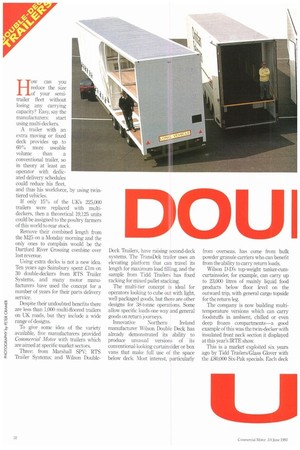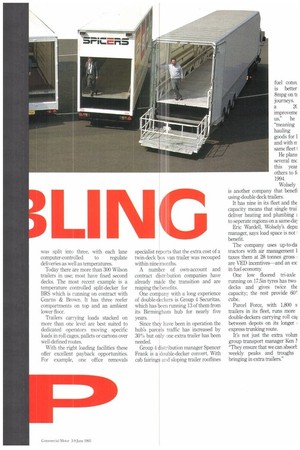H ow can you reduce the size of your semitrailer fleet
Page 34

Page 35

If you've noticed an error in this article please click here to report it so we can fix it.
without lasing any carrying capacity? Easy, say the manufacturers: start using multi-deckers.
A trailer with an extra moving or fixed deck provides up to 60% more useable volume than a conventional trailer, so in theory at least an operator with dedicated delivery schedules could reduce his fleet, and thus his workforce, by using twintiered vehicles.
If only 15% of the UK's 225,000 trailers were replaced with multideckers, then a theoretic-al 19,125 units could be assigned to the poultry farmers of this world to rear stock.
Remove their combined length from the M25 on a Monday morning and the only ones to complain would be the Dartford River Crossing combine over lost revenue.
Using extra decks is not a new idea. Ten years ago Sainsbury spent £1m on 30 double-deckers from RTS Trailer Systems, and many motor manufacturers have used the concept for a number of years for their parts delivery service.
Despite their undoubted benefits there are less than 1,000 multi-floored trailers on UK roads, but they include a wide range of designs.
To give some idea of the variety available, five manufacturers provided Commercial Motor with trailers which are aimed at specific market sectors.
Three: from Marshall SPV; RTS Trailer Systems; and Wilson Double Deck Trailers, have raising second-deck systems. The TransDek trailer uses an elevating platform that can travel its length for maximum load filling, and the sample from Tidd Trailers has fixed racking for mixed pallet stacking.
The multi-tier concept is ideal for operators looking to cube out with light, well packaged goods, but there are other designs for 38-tonne operations. Some allow specific loads one way and general goods on return journeys.
Innovative Northern Ireland manufacturer Wilson Double Deck has already demonstrated its ability to produce unusual versions of its conventional-looking curtainsider or box vans that make full use of the space below deck. Most interest, particularly from overseas, has come from bulk powder granule carriers who can benefit from the ability to carry return loads.
Wilson D-D's top-weight tanker-cumcurtainsider, for example, can carry up to 23,000 litres of mainly liquid food products below floor level on the outward trip, with general cargo topside for the return leg.
The company is now building multitemperature versions which can carry foodstuffs in ambient, chilled or even deep frozen compartments—a good example of this was the twin-decker with insulated front neck section it displayed at this year's IRTE show This is a market exploited six years ago by Tidd Trailers/Glass Glover with the £80,000 Six-Pak specials. Each deck was split into three, with each lane computer-controlled to regulate deliveries as well as temperatures.
Today there are more than 300 Wilson trailers in use most have fixed second decks. The most recent example is a temperature controlled split-decker for BRS which is running on contract with Cearns & Brown. It has three reefer compartments on top and an ambient lower floor.
Trailers carrying loads stacked on more than one level are best suited to dedicated operators moving specific loads in roll cages, pallets or cartons over well-defined routes.
With the right loading facilities these offer excellent payback opportunities. For example, one office removals specialist reports that the extra cost of a twin-deck box van trailer was recouped within nine months.
A number of own-account and contract distribution companies have already made the transition and are reaping the benefits.
One company with a long experience of double-deckers is Group 4 Securitas, which has been running 13 of them from its Birmingham hub for nearly five years.
Since they have been in operation the hub's parcels traffic has increased by 30% but only one extra trailer has been needed.
Group 4 distribution manager Spencer Frank is a double-decker convert. With cab fairings and sloping trailer rooflines fuel cons' is better 8mpg on ti journeys. a improveme us," he "meaning hauling goods for I and with rr same fleet 1 He plans several mc this year others to fi 1994.
Wolsely is another company that benefi using-double deck trailers.
It has nine in its fleet and the capacity means that single trai deliver heating and plumbing to seperate regions on a same-da] Eric Wardell, Wolsely's depu manager, says load space is not benefit.
The company uses up-to-da tractors with air management I taxes them at 28 tonnes gross! are VED incentives—and an ex. in fuel economy.
One low floored tri-axle running on 17.5in tyres has two decks and gives twice the capacity; the rest provide 60°, cube.
Parcel Force, with 1,800 s trailers in its fleet, runs more double-deckers carrying roll cal between depots on its longer express trimking route.
It's not just the extra volun group transport manager Ken I "They ensure that we can absorb weekly peaks and troughs bringing in extra trailers."




















































































